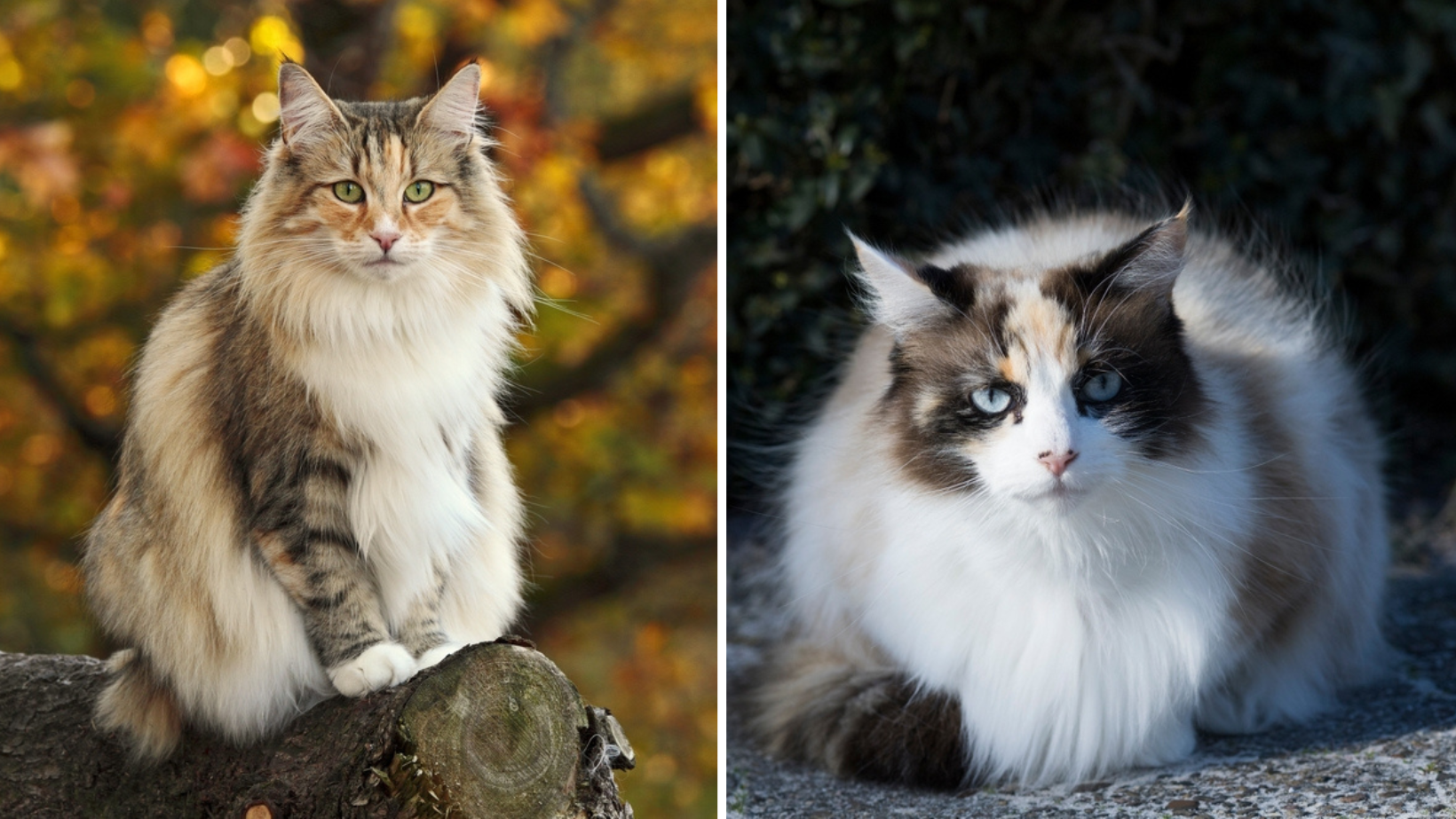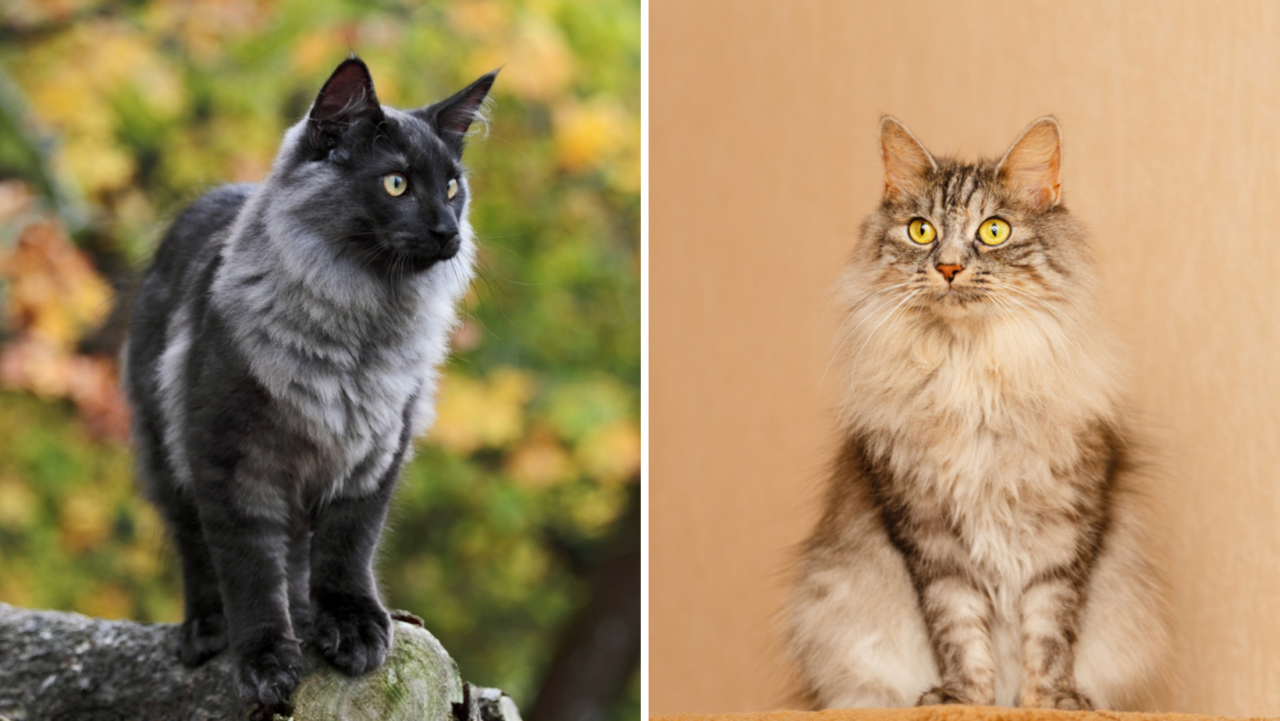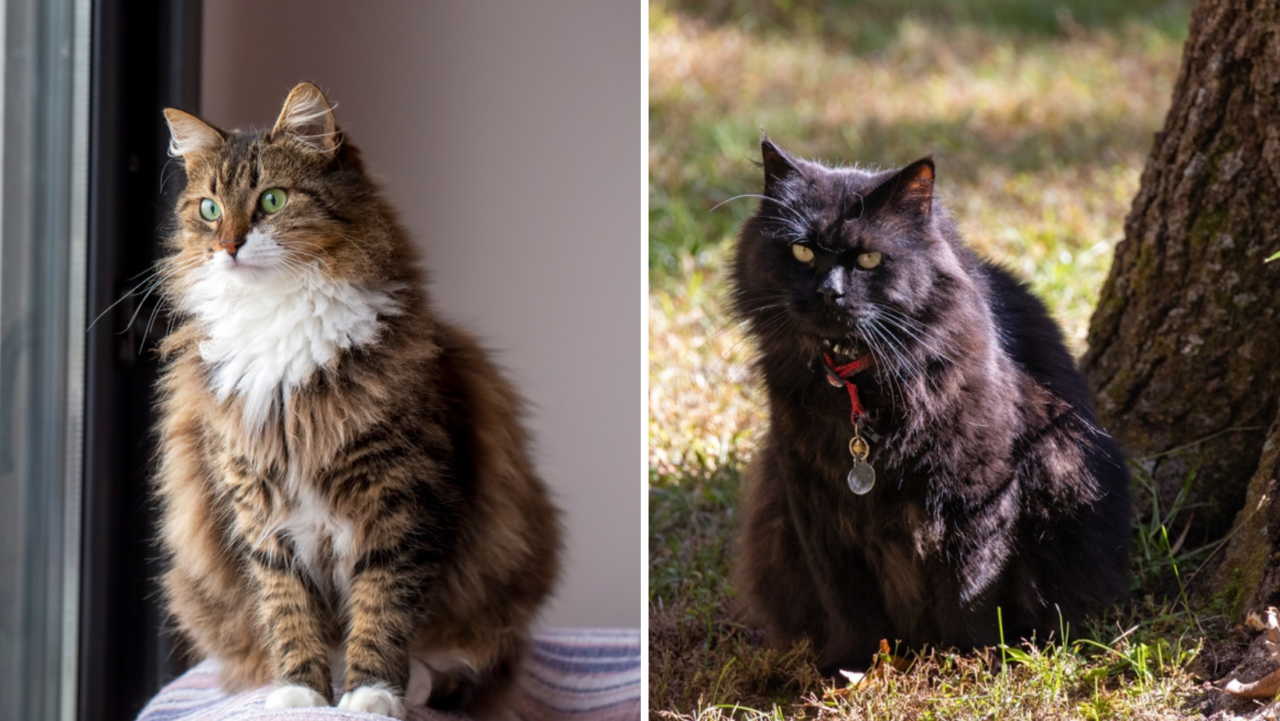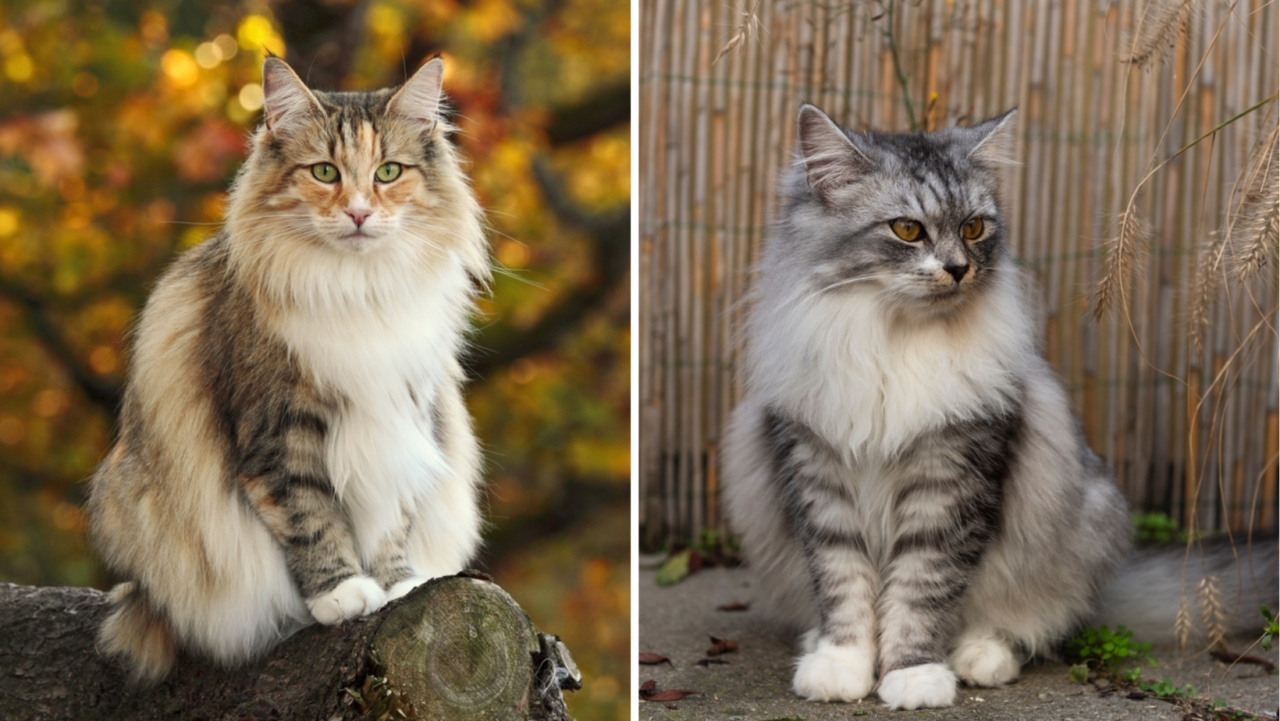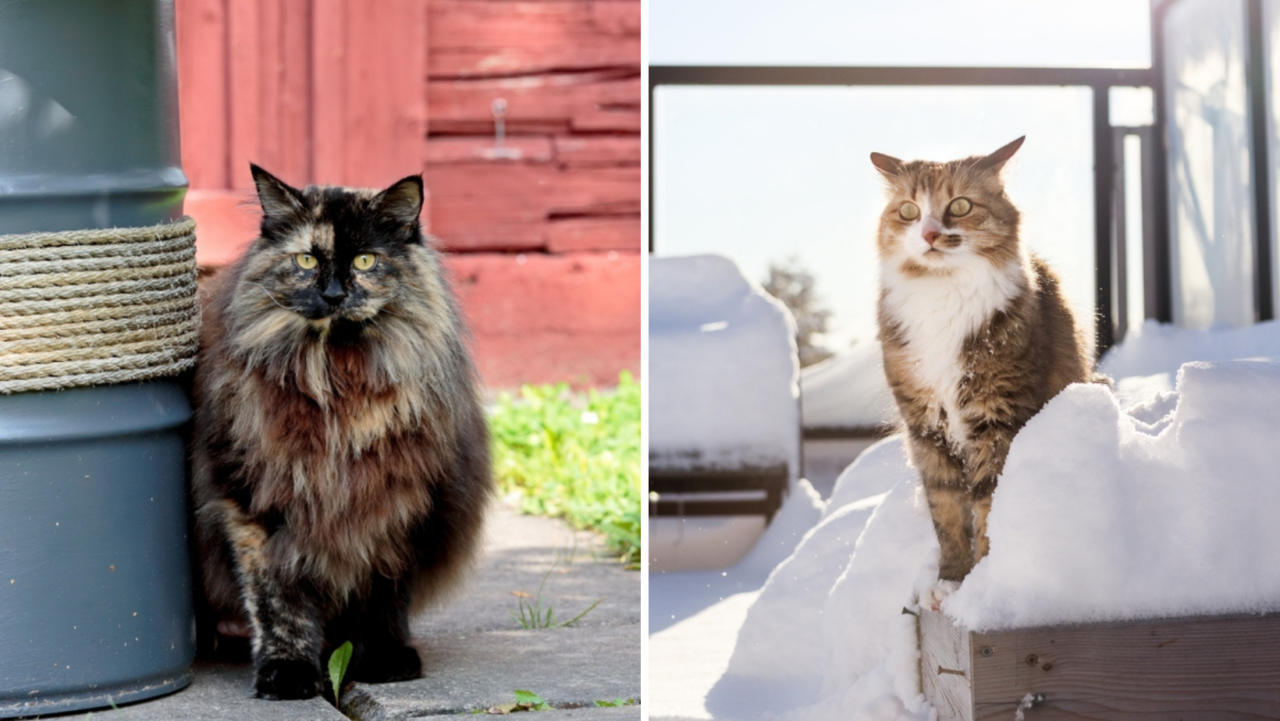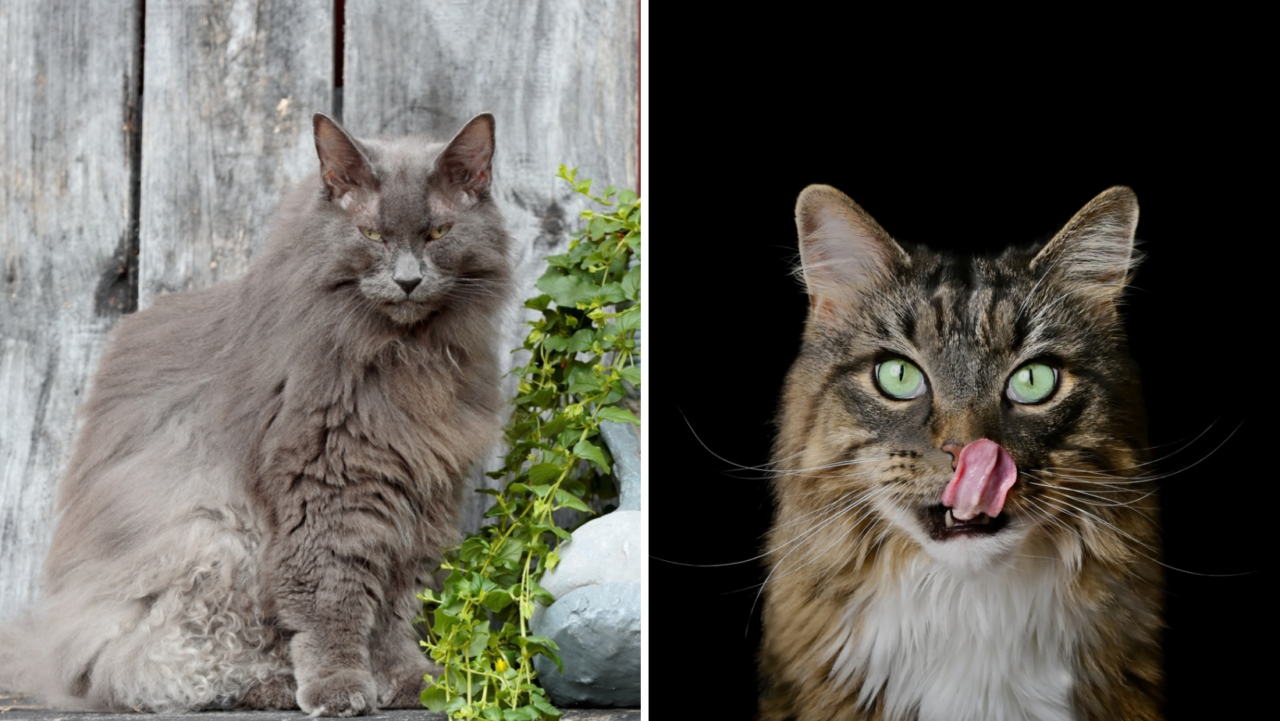📖 Table of Content:
When getting a kitty, you may wonder if you should opt for a pure-breed one or if it’s better to provide a home to a cat that’s been roaming around your garden for a while. A Norwegian Forest cat vs. Domestic Longair: which one will make a better furry companion?
Cats are magical pets that make your life better. But choosing which breed to get isn’t the easiest task in the world. You want a feline that’s going to be able to adjust to your lifestyle and your daily routine. And sometimes, it can take a while before you find your perfect furry buddy.
Norwegian Forest cats probably stole your attention from the moment you found out about them. Their fluffy fur and gentle nature are surely going to keep you wondering if you should share your home with a specimen of this breed.
However, you may have a couple of friends who became cat parents to a breed-less Domestic Longhair kitty. Even though this wasn’t a part of your original plan, you’re seriously reconsidering your choices.
Should you go for your favorite Norwegian Forest kitty or should you adopt one of many Domestic Longhair cats who had lost their homes due to various reasons? Let’s see if I can make this easier for you.
Norwegian Forest cat vs. Domestic Longhair cat: How different they are?
Norwegian Forest cats originate from dark and cold Norwegian forests where they, once upon a time, used to hunt for food on their own. Later, Vikings took them onto their ships and used them as mousers. So, it’s clear that these felines had an interesting history before they were domesticated.
Domestic Longhair cats, on the other hand, have a mysterious history. It’s not really sure when and where they appeared the first time. But it’s obvious that they have a gene that makes their fur long. Still, it’s not enough for them to be claimed as a part of any breed, even though they have similarities with Maine Coon and Norwegian Forest cats.
Now that you know a bit more about the origin of these two types of felines, let’s get into the real stuff. What do they look like and what’s their character like? How needy are they and how can you take proper care of them?
Here’s everything you need to know.
1. Appearance
Norwegian Forest cats are big and muscular, with their weight reaching up to 20 pounds. Female cats are a bit smaller than that, but they’re still fairly large.
These felines have lynx-pointed ears which look similar to Maine Coons. They also have almond-shaped eyes that are going to beg you to give them more food if you decide to adopt (or buy) this breed.
Norwegian Forest cats are also known for their double-coated fur which is the main reason why they’re so soft. Trust me, you could snuggle with them for hours and you would still be disappointed when they decide to leave your lap.
These cats come in many different colors such as white, black, blue, red, cream, silver, and golden. And let’s not forget about all the different patterns. All in all, there are around 60 shades of your favorite Wegies to choose from. That’s impressive!
When it comes to Domestic Longhair cats, there’s nothing about them set in stone beside the length of their fur. They also come in many different colors and patterns and they can have features of different breeds, depending on their origin.
That being said, Domestic Longhairs of Ragdoll origin may have color-pointed fur. Those of Maine Coon origin may have lynx-points on their ears. So, there’s no general rule on how these cats are going to look as it all depends on their genes.
2. Temperament
Norwegian Forest cats are friendly and gentle, so they’re a great choice if you have kids. At the same time, they’re independent felines who are going to leave the room whenever they feel like they need some time to rest.
That’s why it would be best to provide them with some personal space where they will be able to chill and recharge their batteries. Also, don’t expect them to cuddle with you all the time. Even though they’re affectionate, they’ll rarely sit on your lap and even when that happens, it will be by their rules.
When it comes to the personality of a Domestic Longhair cat, things aren’t that simple. Their character usually depends on their heritage, so, you’re never really sure what you’re getting.
But one thing is certain – these cats love to hunt. Their desire to catch the prey has been deeply rooted in their DNA and all you can do is accept it.
If you have a garden and let your Domestic Longhair kitty roam around it, don’t be surprised if she gets you a gift in the shape of a mouse or any other rodent. At least you’ll be sure that your cat appreciates you and wants to thank you by providing you with something precious such as food.
3. Attachment styles
Norwegian Forest cats are independent creatures that are not going to require your constant attention. They will occasionally sit next to your leg but don’t expect them to cuddle with you on the sofa while you’re watching your favorite TV show.
These cats don’t want to be the main character in your household and they certainly won’t make you play with them all the time. Whenever they need some space, they will quietly leave the room and look for a place where they can relax.
They resemble introverts who need to recharge their batteries after spending too much time surrounded by other people. How precious are these furry monsters?
Domestic Longhair cats are also highly independent which makes sense since they’re used to hunting their own food and taking care of themselves. They’re not prone to separation anxiety and can be left alone. However, they can also get really close with their owner and form a strong bond.
All in all, you never really know what you’re getting yourself into with these felines.
4. Grooming needs
Cats love to keep themselves clean and tidy, and usually, they’re pretty good at their job. But sometimes, they need our help.
Norwegian Forest cat is the type of feline that will require you to groom her at least two times a week. The reason for that is her thick, double-coated fur which needs to be thoroughly brushed and combed.
This way, you’re going to save your kitty from hair mats which can get pretty uncomfortable and irritate their skin. But as long as you keep their coat all nice and brushed, there shouldn’t be any issues.
Domestic Longhair cats also require some serious effort during grooming. Due to their long fur, you’ll need to brush them at least a couple of times a week.
These felines are also prone to hair mats so, no matter which breed you get, you’ll need a good, sturdy comb and a brush that can reach underneath all that thick fur.
5. Health issues
Taking care of your cat’s health is one of the most important things you can do for your pet. So, you should never skip regular vet check-ups since those are the best way to discover if your feline is dealing with any health concerns.
Now, when it comes to Norwegian Forest cats, they’re a fairly healthy breed. However, they can face issues such as hypertrophic cardiomyopathy, hip dysplasia, and glycogen storage disease type IV.
All of these are hereditary diseases so the best way to avoid your cat experiencing any of them is to get her from a reputable breeder who has done all the tests and can provide you with all the information you need.
Your Domestic Longhair cat won’t experience any of the health concerns that are directly related to the breed. Of course, the reason for that is the fact that this is a breed-less feline whose origin is unknown.
However, she can experience issues such as hot spots from matted fur, hyperthyroidism, and feline urinary tract disease. These are all common among cats, especially as they grow older.
Norwegian Forest cat vs. Domestic Longhair cat: Which one to get?
Now that you know all there is about these two different felines, the time has come for you to make a decision. Which cat is perfect for your household?
It all comes down to your lifestyle and your expectations of your pet. None of these are your typical lap cats that are going to cuddle with you all day long. We’re talking about independent felines who love being active but who are affectionate at the same time.
The main difference between them is that you generally know what you’re getting with a Norwegian Forest cat. Of course, each feline is different but at least you can predict what to expect if you opt for this breed.
Domestic Longhair cats are unpredictable since we’re talking about breed-less kitties. So, you can’t really tell if you’re getting a calm, affectionate cat or an aloof, overly-independent one. It all depends on their origins which are often unknown.
No matter which cat you opt for, I’m sure you’re going to enjoy every second of your time with her. These little furry monsters definitely know how to change our lives for the better and we’ll be forever grateful for that.
